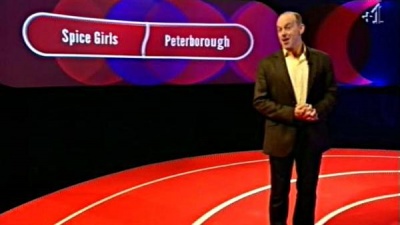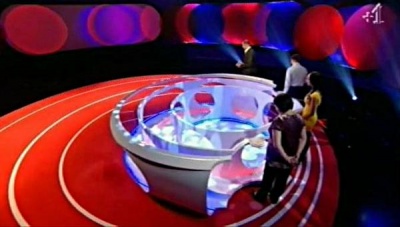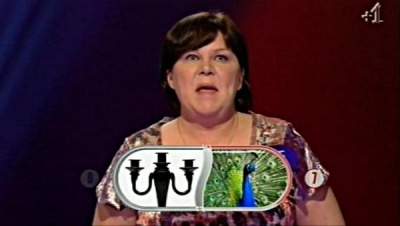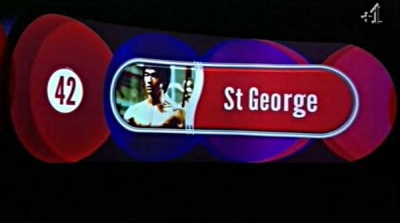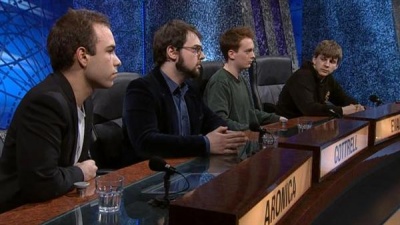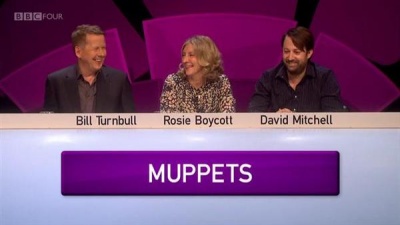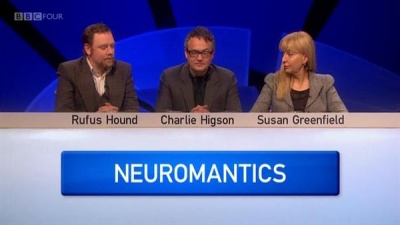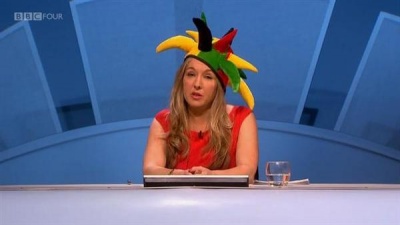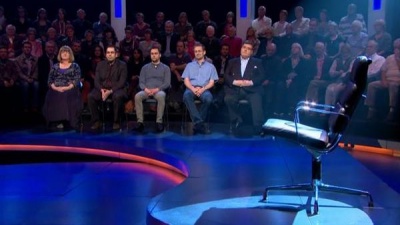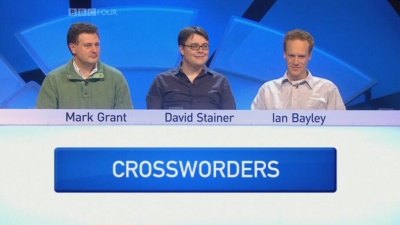Weaver's Week 2013-03-17
Last week | Weaver's Week Index | Next week
"It's not what you know – it's how you think" is always actually determined by what you know, notes Brig Bother.
Contents |
The Common Denominator
Endemol for Channel 4, weekdays from 18 February
What is the link between two apparently unconnected concepts? Between, for instance, "estate agent" and "game show host"? According to Channel 4, the answer is "Phil Spencer", because he appears a lot on the channel blethering about "properties", and he also hosts this programme.
A jazzy, upbeat, brassy theme introduces the show, and then we see the set. It has circles inside each other, but offset so they gather to one side. At the focus of this design is a large table. What is the designer getting at here? "Things are not always as they seem"? Some sort of retro-vibe from circa 1960? "We've bought this massive glass table and we're darned well gonna use it"?
Slotted around the table are three players. One by one, they'll step away from the massive glass table and stand by its side. There, they face a large screen, on which will appear up to four puzzles. Each puzzle is inscribed on an oval pill, which is split down the middle. Phil asks the standard question, "What is the common denominator between..?" The contender then has ten seconds to blurt out answers hoping to crack the riddle they see. Succeed, and not only will they be rewarded with a point, but they'll have the satisfaction of seeing the pill spring open, revealing their answer inside.
In the first round, the puzzles themselves are single words or very short phrases. The links can be thematic, they can be synonyms or phrases, they can be to do with celebrity works, they can be a combination of the above. For instance, if a riddle were "Jedward" and "Pig", the answer would be "Lipstick"; the Irish duo did rather well at Eurovision with a song called "Lipstick", and one can't put lipstick on a pig. We found the questions tilted towards popular culture and never to high culture, and there was more knowledge of commercial products and advertising jingles than we'd ideally like.
One problem with The Common Denominator is that the questions often have more than one answer. Estate agent and game show host? That could be Nick Hancock, who bowed out of the limelight for part of the last decade. Or it could be John Leslie, who has found a new career away from the rip-roaring success of Scavengers. Very often, it feels like the "common denominator" they've got can be one of two or three reasonable possibilities, and occasionally boils down to "what is the common denominator we've thought of between..?".
Should the contestant solve their puzzle in the ten seconds, they receive a point. If they don't, they don't; it's not off for a bonus. This encourages speculation, guesswork, flannelling around the problem hoping to stumble upon the answer. There's nothing intrinsically wrong with this, but sometimes the right answer appears during a stream of consciousness and Phil has to backtrack to bring it out.
There's another problem: the scoring is often insufficient to split the players. If the producers want a tie-break every game, then that's their decision. This column respects draws, doesn't like tie-breaks, and if someone must leave we'd rather it was organically from the game. Giving one point for each second left on the clock is one idea; another is for the player to press a buzzer in the first few seconds, signifying they'll give just one more answer. Or just give a bonus point if the player spots the link with their first answer. Any or all of these would increase the variance between scores.
The tie-break is another question of the same format, played on the buzzer, with just one answer accepted. A correct response sees that person progress, an error eliminates them from the game. With two players, the questions change into two pictures, and if the first player can't solve the riddle in their ten seconds, it goes straight to their opponent for a potential bonus. Whoever has the lead after four questions wins, and again there can be a tie-break – performance in the first round is completely discarded.
The final round is the cash round, for the daily winner. There's 45 seconds to solve six puzzles, each consisting of a picture and a word, and the player's allowed to pass on just one question. The cash values start small – £100, £250, £500, £1000, but then ramp up steeply, to £2500 and a possible £10,000.
The sharp kick at the end reminds us of the money chain from the North American syndicated The Weakest Link – again, six steps, leaping at the end from $5000 to $25,000. Unlike certain other shows offering a £10,000 jackpot, we can tell this one can be won by a suitably brave and intelligent player without superhuman efforts. While an endgame played for 10 grand is exciting, most of the decisions are of the form, "you have a modest amount of money, 35 seconds and a pass; do you want to play on for a mildly more immodest amount?" This lacks tension and is a trifle dull.
The endgame also tends to hog the programme a little, typically taking up six minutes of the 22-minute running time. A worse timewaster is the commercial break in the middle. It's placed two questions into the middle round, meaning that Phil has to slow down the game and throw into the break, then recap the position and how to play this round immediately afterwards. Even with the best will in the world, that's nearly a minute of the running time wasted. We'd rather see it at the end of round one, a very natural break.
Our conclusion is that The Common Denominator is a workable format, but the current implementation has enough little flaws and holes to distract and annoy. Phil Spencer is an adequate host, and – if the show's renewed – we hope that he's able to inject a little more personality into later series.
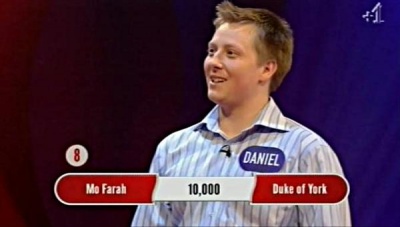 Was he as successful as Mo Farah on The Cube?
Was he as successful as Mo Farah on The Cube?
Recent contestant Daniel Peake is forecast to discuss his appearance on tomorrow's edition of The Fifty 50 Show, the podcast where an excellent gaming experience is guaranteed.
The answers to the sample questions are: Posh, Cluedo, and Dragon. Well done if you got those at home.
University Challenge
Group phase, match 6: Imperial v Bangor
Winners here get to face next week's losers; losers here get a taxi to Piccadilly and then home. As seems to be the team tradition, Bangor get off to a good start, with bonuses on peaks and American writers. Imperial score with mathematical groups and the scientist Maxwell. The visual round asks for a fruit when shown a map indicating the top five exporting countries. Do the Dutch really lead in the export of grapes? It's 45-45.
Time for Bangor to stage a comeback, with Words Differing By An Additional O. A bonus for a businessman who's worth his weight in gold? Got to be more than £30,000: high-flying businessmen spend that sort of money on a plate for their sandwiches. Imperial draw level with knowledge of actors, only to lose it on a missignal and Bangor's knowledge of Scandinavian food. Jazz forms are the subject of the audio round, and Bangor has a slim lead, 80-75.
It doesn't last: Imperial take the lead with the Royal Society's motto, but Bangor strike back with a set on memorial sculptures, and the works of Vangelis. The common name of the star alpha Canis Maiorius? It's the John McEnroe star: you cannot be Sirius. The second visual round is on French queens consort, and Bangor's lead has reached 110-90. Nothing in it. Bangor get a starter on the phenome, and then there's tonight's Headbanger's Ball.
- Q: "Wars begin when you will, but they do not..."
- Imperial, Henry Guille: Nicolas de Medici! No! Oh!
- [Mr Guille rests his head against the desk]
- - AUDIENCE: Aw!
- - Sorry, I'm afraid I have to fine you five points, too.
- "..but they do not end when you please." This statement appears in The History Of Florence, a 1524 work by which political philosopher?
Machiavelli is correct, as Bangor's captain spotted, and they progress with a set of bonuses on poets. Imperial come back with some antibiotics, but it's clear that Mr. Guille is still smarting from his interruption a little earlier. The game's still open, Bangor need a couple of starters to be sure; a couple of dropped starters will help their cause. Karl-Marx-Stadt falls for Bangor, and a set of bonuses on Lots might prove enough. "Ridiculous", says Bangor to the next starter, correctly, and that feels like game over. A full set of bonuses on medical terms means it is done.
Would the result have been different if Mr. Guille had got that question right? Possibly: the gap would have been about 15, but it suddenly shot to over a hundred. In the end, Bangor score their biggest win, 210-120. All of the Bangor team (with the possible exception of Nina Grant's dinosaurs) got at least one starter, and the team had 22/33 bonuses right.
Only Connect
Comic Relief special: Neuromantics v Muppets
"These people need no introduction," says Victoria Coren. However, as this is a text service, we'll note that Rufus Hound, Susan Greenfield, and Charlie Higson are the Neuromantics. Bill Turnbull, Rosie Boycott, and David Mitchell are Muppets. Incidentally, we were very pleased to hear recently that not only are the real Muppets back later in the year, but they've also got some of the greatest scriptwriters in the business working with them.
Round one is connections: what links these four seemingly unrelated things. "Fighting a liar", "Blushing crow", "Well-boiled icicle" has the team thinking about card games, but "Queer old dean" in the final moments gives the point. Well, to the opposition, who know it's the Rev. Spooner's spoonerisms. For the Neuromantics, it's £100,000 and goodnight. What, that's their first clue? "Deep purple" and "PG Wodehouse", but "Jack Horner's thumb" is the plumb giveaway. 2-0 to the Neuromantics.
Pictures for the Muppets: a man hurdling, some lavender, a robin, and an empty rabbit's hutch. Time expires just before Mr. Mitchell buzzes. As the other side get, it's halves of crime-fighting duos: Hutch with Starsky, Robin with Batman, Thyme with Rosemary, and Pascoe goes with Dalziel. "On a tightrope: 44.63". "Inside a pantomime horse: 12.05". Rufus has the idea: times someone has completed something. 100 metres in various costumes? It took three clues, two points, 5-0 the lead.
Ba-ding! "Oh, brilliant," says Mr. Mitchell. It's the music round. Charles and Eddie, Frank Sinatra, the Spice Girls (must be famous, David knows of them), David Bowie, and they reckon the link is parts of the body. No. The other side are also stumped. "Would I lie to you", "Come fly with me", "Who do you think you are", "Ashes to Ashes", as all seen on BBC1. For The Neuromantics, it's "The Stereophonics" (and we claim five), "The Disney Channel", "The Samaritans", and "The Facebook". The link is not Justin Timberlake; The Muppets get the point, because they've all dropped the "The". Neuromantics lead 5-1.
Sequences come in round two: what's the fourth in the list? Flopsaut and Trotsaut and Queue-de-Coton. "Think laterally" is Victoria's clue: "Pierre", being Peter Rabbit and his siblings in French. "It's ripped off or a bad translation," grumbles Mitchell, two points to the better. Next! Young and Lawley, and Rufus reminds that it's useful to buzz. First was Plomley, because this is presenters of Desert Island Discs, and Charlie Higson would like to appear on the show. The Neuromantics ahead, 8-3.
Fan, Importance, and Rosie thinks that we're with the final words of the title Oscar Wilde plays. Husband is the third clue, and they guess at Salome. "Not a bad guess," says the host. Stop buttering up your husband-to-be. Second play was "A Woman of No Importance", so "Earnest" was the fourth. Pictures for the Neuros: a Hollywood star, an oval mirror, and the chain in some chainmail. Time expires, and no-one has it. Top-selling daily papers: Star, Mirror, Mail, Sun. Still 8-3.
Goddess of Spring, Wife of Jupiter, Julius Caesar: David works it out, etymologies of months, so August is named after Augustus Caesar, and two points. The Neuros find themselves asking who was The Fourth Man, because Maclean and Burgess were the First and Second Men, and Philby presumed to be The Third Man. Three points, so the Neuromantics lead, 11-5.
Seven minutes to the hour, connecting wall o'clock, and the Neuromantics have the first wall. Six or seven U2 albums on the wall, as are some national parks in California. By getting the U2 albums early, we reckon they've solved the wall: types of pants are a third link, and they're spending some time trying to work out the final connection. A lot of time. Time expires before they can get their pants up; the final link is ___corn words. Five points!
Areas in a golf course appear to be a set for the Muppets, and they get types of therapy quickly too. Superhero -man is one possibility, but we're going to have to hear Rosie explain the last two. Things that go on the end of materials, and ___ belt words. Perfecto! Ten points!
Which means the Neuromantics retain their lead, just, 16-15. The bells have been removed from Victoria's jester's hat, and we've reached the Missing Vowels round. US criminals and outlaws is the first set, the Neuros know their baddies, sweeping the set. Italian landmarks is more rounded: 2-2. Popular songs that were originally B-sides ends up with the Neuromantics 2-0, and they get that Joanna Lumley was born in India. All of which means the Neuromantics win by 25-17.
And if you've enjoyed that, donations are open at http://www.bbc.co.uk/comicrelief
Mastermind
Semi-final 4
Christine Plume kicks off with the Life and Films of David Niven (1910-83). The archetypal "English gentleman", good looks and upper-class accent, Niven is best remembered for such films as A Matter of Life and Death (1946), Around the World in 80 Days (1956), and Separate Tables (1958), for which he won an AMPAS award. Niven had already spent several years in the British army, and would recount tales in his autobiography The Moon's a Balloon (1972). The round finishes on 7 (1). Watch more: Separate Tables*.
Shahab Mossavat will take Edward III (1312-77). Brought to power after a coup against his father, Edward III began the Hundred Years' War to promote his claim to the throne of France. He also established a second chamber of parliament, created the office of Justice of the Peace, and used English rather than French as the official language. The contender answers in English, and swiftly, to 9 (0). Read more: Encyclopaedia Britannica.
Mark Skinner has been listening to the Pixies (1986-93). A four-piece band from Boston, Pixies made an unusual blend of guitar music, combining punk's discordancy with the broad vista of surf music and the riffs from pop. Over this were confusing lyrics about intellectual topics – religion, interstellar space, pop culture. The group has become one of the most influential of its era, directly inspiring Nirvana, U2, Radiohead, and PJ Harvey. Just the one slip in a round that shoots to 12 (1). Hear more: Doolittle*.
Didier Bruyere looks at the Life of Giuseppe Garibaldi (1807-82). The Italian republican and socialist was sent to Brazil in his youth; his fashion thereafter was a Gaucho cowboy. He fought military and political campaigns to bring together the disparate states into what we now know as Italy, unified after his death. On his campaigns, limited rations and space meant his armies ate a meal in a biscuit. No flies on this contender, making 9 (0). Nom more: Easter Garibaldi biscuits recipe
Chris Cann has been reading the Flashman novels of George MacDonald Fraser (1925-2008). These works use a character invented by Thomas Hughes in Tom Brown's Schooldays, and tell of Flashman's life after being sent down from Rugby school. Flashman describes himself with pride as "a scoundrel, a liar, a cheat, a thief, a coward and a toady". More on that sort of thing later. The contender recovers from an early error that surprised him, closing on 9 (0). DID more: Fraser on Desert Island Discs (2001).
Christine Plume got here on 5 October, taking "A Dance to the Music of Time". Singer and Constable and the Collected Works of Wallace and Gromit get the contender off to a good start, and she continues to pile on the points. The round does come to a slow end, and the final of 18 (2) doesn't feel like a winner.
Shahab Mossavat has changed his tune somewhat from 14 September, when he took Terry Venables. This round starts briskly, falls into a spiral of error, has a bit of a recovery, but closes on 14 (0). In his two appearances, a total of zero passes.
Didier Bruyere was here on 1 February, when he took Marie Curie. Again, the round starts strongly, again there's a bit of a spiral of error. This contender is able to pick himself up and plough on, and the score of 19 (0) gives him the lead for at least two minutes.
Chris Cann came in as a high-scoring loser, with the Savoy Operas of Gilbert and Sullivan on 10 August. Unlike the others, this round starts slowly and finishes with a flourish, but only to 16 (1).
Mark Skinner needs eight to win, just enough to cause a little doubt. He qualified with Tintin on 25 January. After a confident start, the contender again falls into a circle of errors, but keeps on picking up the odd point here and there. Carpathians give him a point on the bell, but he has (3) passes to go with the 19 points.
It's a long, slow walk back to the chair, knowing that he was close, but not close enough. Didier Bruyere progresses to the final.
Bad news for the good people of Creamguide: it's the fifth of six semi-finals next week, so the grand final is scheduled for 5 April. Er, a celebration to mark the end of the tax year?
This Week And Next
We're sorry to read of the death of Tony Gubba. It only seems like a few weeks since he was commentating for Dancing on Ice, which it was – his terminal illness was mercifully short. In addition to the pro-celebrity ice dance show, he worked on canoeing exhibition Paddles Up, and was lead commentator for The Football League Centenary tournament in April 1988.
The Television and Radio Industry Club handed out its awards this week. Ant and Dec won the TV Personality award, and there was a TRIC Special Award to I'm a Celebrity... Get Me Out of Here!. The Digital Programme award went to Celebrity Juice, and Reality Programme to Strictly Come Dancing. This year's best weather presenter is Carol Kirkwood.
This year's run of The X Factor may be the preliminary round of a theatre casting show. X Factor – It's Time to Face the Musical! will open in the West End early next year, written by Harry Hill (book) and Steve Brown (songs), and with the blessing and involvement of Simon Cowell (interval ice-creams).
Brain of Britain news, and Jenny Dunn kicked off this week's programme with a Five In A Row, albeit with a little luck as her answer of "World Anti-Doping Association" when it calls itself an "Agency" was ruled correct. The rest of the programme turned into a scrappy battle, none of the contestants regularly advanced their scores. Anthony Fish ran closest, but Jenny secured the final spot in the final. We note that the next Top Brain programme – scheduled to be made in early 2018 – could yet feature all three of Only Connect's Crossworders, qualifying in order from right to left.
Ironic applause to The Sunday Telegraph, because last week's edition picked up the news that Barry Simmons would be competing in the Brain of Britain final. The reactionary paper, only two weeks behind the news, found approximately three people who questioned whether the Egghead should be allowed to compete, and – by giving a brief biography cribbed from another wiki, and liberally reproducing Brain of Britain questions – blew this storm up to almost half a page.
Remember Stella English? She was The Apprentice for 2010, and has been back in the news after taking Alan Sugar to an employment tribunal. When she arrived at his Viglen subsidury, Ms English was told "there is no job". Though appointed as an apprentice and to be mentored by Mr. Sugar, Ms English said she only saw him half-a-dozen times in a year before being told her contract would not be renewed. She was told how it would be "better all round that you didn't walk out", and reassigned to the You View project. Mr. Sugar is implied to have said that he didn't care two hoots about his colleague. Ms English resigned her post and claimed that her resignation had been forced by Mr. Sugar's companies.
"I did it for the BBC and the integrity of the show and a bit of my own PR and a bit of yours too." That was Alan Sugar's response, explaining why he agreed to be the face of The Apprentice. Mr. Sugar said that Ms English was untrusting, suspicious, and full of conspiracy theories. She was "deluded", talking "total garbage", and telling "lies, blunt lies". Ms English, according to Mr. Sugar, was engaged in "a classic abuse of the tribunal system." This was "an attempt to extract money from me" and his erstwhile employee was using the media as a weapon. Judgement in the case has been reserved.
If Mr. Sugar's opinion of Ms English's character is correct, then we may conclude that his ability to assess people during the televised protracted interview process – including a three-month trial period in Mr. Sugar's companies – is deeply flawed. We also get the impression that Mr. Sugar is not seeking someone he can train, but is after a huge amount of publicity for himself and his companies, at the relatively cheap cost of paying one person £100,000 each year. All of this raises questions about The Apprentice: is it a programme the BBC can justify making? Would it be possible for Mr. Sugar to remain in position, should it be demonstrated that the apprenticeship is illusory? Will Nick Hewer ever appear on telly again?
For the record, Alan Sugar has himself left the You View company, apparently following a disagreement with Richard Desmond of Channel 5.
BARB ratings for the week to 3 March, and after a couple of weeks in runner-up spot, Dancing on Ice returns to the most-viewed game show, with 6.65m seeing the performances. Saturday Night Takeaway registered 6.6m, and the conclusion of In It to Win It 5.55m. The first half was seen by just 4.5m. Pointless Celebrities and Famous Family Fortunes both scored 5m, The Cube returned to 4.1m. University Challenge topped BBC2 with 2.95m, and Celebrity Juice (2.15m) beat Great British Menu (2.1m). 8 Out of 10 Cats led Channel 4's meagre game offerings with 1.8m viewers.
This week, it's the grand final of Brain of Britain (Radio 4, 3pm Mon). There's a couples edition of Who Wants to be a Millionaire (ITV, 7pm Sun), do tune in a bit late to miss Seb Coe. St Patrick's Day brings the All Ireland Schools Talent Search (RTE2, 3.55 Sun), and Paul Hollywood gets his spin-off show on BBC2 (8.30 Mon). Next Saturday features a Doctor Who edition of Pointless (BBC1, 7pm), the return of Who Dares Wins (BBC1, 7.45), and Ant and Dec having fun with One Direction (ITV, 7pm).
To have Weaver's Week emailed to you on publication day, receive our exclusive TV roundup of the game shows in the week ahead, and chat to other ukgameshows.com readers, sign up to our Yahoo! Group.

